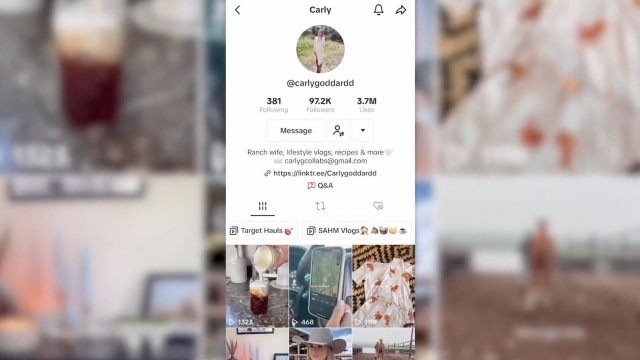Five TikTok content creators are suing the state of Montana after the state’s governor, Greg Gianforte, signed a bill into law that would ban the app.
The law says TikTok can’t "operate" in Montana and that mobile app stores would have to stop offering the app up for download in the state.
If they don’t abide, app stores could face fines of $10,000 per violation and be "liable for an additional $10,000 each day" the violation continues.
The law will go into effect on January 1, 2024, unless overturned or amended.
Carly Goddard is one of the TikTokers suing the state, she says she couldn’t believe it when she found out the bill was signed into law.
"I know this may sound stupid, but I cried. I broke down," said Goddard.
With more than 97,000 followers, Goddard creates lifestyle videos, sharing her morning routines and life as a mom and wife to a rancher.
"I was inspired by another mom content creator. And I was kind of going through a rough time. And so, yeah, I just kind of wanted to find my purpose. And I feel like I've done that on TikTok," said Goddard.
She says most of her family’s income comes from brand deals, where she works with businesses, including small businesses, to promote their products on her page.
"This is my livelihood, and I mean this money. I use it for bills, to put food on the table for my family. And I just feel like it's going to have this huge impact on me. And my husband and I have even been talking about moving if, you know, it doesn't get reversed," said Goddard.
SEE MORE: Montana becomes first state to ban TikTok
In an effort to get the law overturned, the complaint argues that the state does not have the power to handle national security matters. It also says the law is unconstitutional and violates the First Amendment, among other things.
Gianforte posted on Twitter Wednesday, saying he signed the bill to "protect Montanans’ personal and private data from the Chinese Communist Party."
The ban comes after dozens of states have already banned TikTok on government-issued devices, but Montana is the first state to pass a total ban.
The law says the ban would be void if TikTok is sold and breaks ties with its parent company, ByteDance, which is based in China.
To date, there is no public evidence that suggests the Chinese government has accessed U.S. user data on TikTok.
Pamela Wisniewski, an associate professor in the computer science department at Vanderbilt University, says the law would be difficult to enforce.
"I mean, why don't we just build a proverbial firewall around the US and just keep our DNS servers to only U.S.-based companies? And so that's like a modest proposal that like anybody would say, oh, that's just too extreme," said Wisniewski. "But if we're doing it for one particular app, well, why aren't we looking at the source of where other websites are on the Internet? And so that's my biggest concern is that I think we're doing this more based on fear."
Wisniewski is also worried the ban would put some people who aren’t as tech-savvy at a disadvantage, saying people would figure out a way to go around the ban, like spoofing their IP address to make it look like they’re in a different location.
"Yes, there is a lot of garbage on TikTok and things that are inappropriate for younger children to see. But like you said, there's educational videos, there's activism, there's support for minoritized communities like the LGBTQ population, and ways to empower those who otherwise wouldn't be given a voice. And so, we don't want to take away these platforms," said Wisniewski.
The enforcement is going to be tough. There are still a lot of unanswered questions. Like, what would happen to those who already have the app downloaded to their devices?
Since the law applies to app stores, it doesn’t rule out users being able to access TikTok on the web, so it’s unclear whether that would count as a violation of the law.
Trending stories at Scrippsnews.com




